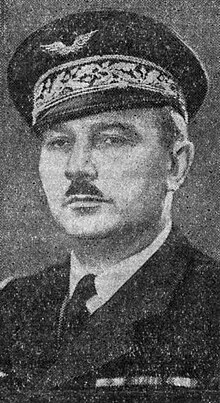Marcel Têtu
Marcel Têtu | |
|---|---|
 Tetu as vice-governor of French Equatorial Africa, 13 November 1940 | |
| Birth name | Marcel Louis Joseph Têtu |
| Born | 30 October 1888 Chalon-sur-Saône, France |
| Died | 15 December 1983 (aged 95) Nice, France |
| Allegiance | |
| Service | Armée de l'Air |
| Years of service | 1908–1942 |
| Rank | General |
| Wars and battles | |
| Alma mater | École Polytechnique |
Marcel Louis Joseph Têtu (30 October 1888 – 15 December 1983)[1] was a general of the French Air Force during World War II.
Early life
[edit]Marcel Têtu was born in Chalon-sur-Saône, France on 30 October 1888, and he entered the French Army artillery and the air corps after graduating from the École Polytechnique in 1908.
Promoted to the rank of général de corps aérien (lieutenant general), he was appointed second in command to the Air Force Chief of Staff, General Joseph Vuillemin, by the left-wing minister Guy La Chambre.[2]
World War II
[edit]Têtu commanded the Cooperative Air Force during the Battle of France in 1940, leading both British Royal Air Force, including the British Air Forces in France, and French Air Force planes against the German Luftwaffe. He was responsible for liaison between land and air forces for the Théâtre d'Opérations du Nord-Est (North-eastern Theatre of Operations) under General Alphonse Georges. The Theatre of Operations consisted of three army groups; one of four armies (Army Group 1), one of three armies (Army Group 2) and one of one army and reserves (3rd Army Group (France)).[3]
On 22 June 1940, he pledged his loyalty to Vichy France, and he became a colonial administrator in Gabon as Deputy Governor General of French Equatorial Africa. In October 1940, Gaullist Free French forces invaded Gabon, and Têtu was forced to surrender at Libreville on 9 November. Têtu refused to join the Free French, and he was interned in a prisoner-of-war camp for two years. He died in Nice in 1983 at the age of 95.
References
[edit]- ^ Archives départementales de Saône-et-Loire, état-civil numérisé de Chalon-sur-Saône, naissances de l'année 1888, acte No. 442 et sa mention marginale de décès, vue 118/141 de la numérisation.
- ^ Lacroix-Riz 2008, p416.
- ^ "French Army Order of Battle, 10 May 1940". france1940.free.fr. Retrieved 2023-04-10.
References
[edit]- Philippe Sanmarco (2012). Livret militaire (in French). Tallendier. p. 71.
- Patrick Girard (2010). De Gaulle, le mystère de Dakar (in French). Editions Calmann-Lévy. ISBN 9782702149379.
- Alistair Horne (2010). Comment perdre une bataille [To lose a battle : France 1940] (in French). Translated by René Jouan et Françoise Arnaud-Demir. Paris: Éditions Tallandier. ISBN 978-2-84734-657-2..
- Lacroix-Riz, Annie (2008). De Munich à Vichy: L'assassinat de la Troisième République 1938-1940 (in French). Éditions Armand Colin. ISBN 9782200243654..
- Walter J. Boyne (2005). The Influence of Air Power Upon History. Casemate Publishers. p. 207. ISBN 9781844151998.
- de Gaulle, Charles (2000), Mémoires de guerre: l'Appel (in French), Paris: Bibliothèque de la Pléiade - Éditions Gallimard, pp. 98 and 118–120, ISBN 2-07-011583-6.
- Ernest R. May (2000). Strange Victory: Hitler's Conquest of France. I.B.Tauris. pp. 391–430..
- Thierry Vivier (1997). La politique aéronautique militaire de la France: Janvier 1933 - septembre 1939 (in French). Éditions L'Harmattan. ISBN 9782296333451.
